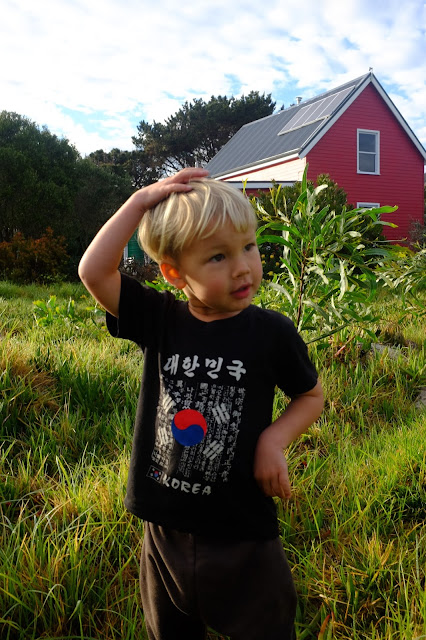 |
| So much work to get to this state of chaos (which I like quite a bit). |
This year we had some peaches, some apricots, some strawberries, and some different kinds of squash. Maybe a few tomatoes (time will tell how many). It's not exactly time to cut our ties with stores. Starting a farm that's focused on fruit production is the ultimate in delayed gratification, in faith. All that stuff. I have read approximately 2 trillion words about growing stuff, and have been trying a fair bit with my hands dirty and all that. Yet there's a huge amount of luck involved. The amount of patience needed for just one pomegranate is fairly breathtaking. Even when we have a great climate for pomegranates.
I'm nothing if not predictable: if you read concrete gardener a lot, you'll probably be able to just channel the rest and not waste time reading it:
Anyway, so if you're still with me there's this other thing I sometimes do. Not much, because now I have three kids and a farm and try not to leave the house ever. But I sometimes, rarely, go to academic conferences and meetings. Sometimes even writing retreats. A lot of the time we're talking about heady things like making the world a better place and bridging health inequity (and if we're going wild health inequity becomes a proxy for general inequity, because general inequity is health inequity) between rich and poor. It's awesome.
There's always lots of food at these conferences. And I am always the #1 fan of the food. because a) it's a meal I didn't have to prepare b) it often contains meat, which I want to be extra grateful for c) it's free and often quite abundant d) it's typically something nicer than my day-to-day meals. Yes, my day-to-day meals have a certain rustic charm.... they are often healthier and don't taste as factory-ey (though sometimes conferences are all fresh and local, too). Sometimes people don't like the food. I guess I'm setting up imaginary people, because it's not like I'm going to conferences with a bunch of jerks. These are really great people. But sometimes the food is not up to their standards. And sometimes it's totally up to their standards and (particularly with women) there comes this whole discussion of how much weight they're going to have to lose after the conference is finished.
And I guess I want to say: even the crappiest food, far removed from anything, mainly made in a factory, involved people and work and even soil. It sucks when it involved people who weren't valued, when the land wasn't valued, when the animals we're eating weren't valued. But there is this ease that comes alongside judging food that seems to overlook how incredibly difficult farming can be-- especially when we're demanding food that's organic and happy and valued and has terroir and all that. It's a lot to ask unless there are a lot of us growing stuff. When juxtaposed with the homesteaders on permies.com who are trying to eek another 100 calories out of their plot, it's a powerful contrast. So I'm totally grateful when I'm given plentiful calories. And I'm so grateful to be trying to make better quality calories; working without pesticides or fungicides on peri-urban land (in our case, sand) is pretty challenging.
Self-sufficiency is a powerful idea to pursue not because you end up making everything yourself. That's a long way off for me and my family. But the idea remains powerful-- whether in the form of electricity or wood for fires or food or water or compost-- because it forces us back to basics. To knowing all that stuff takes a ton of work and the best we can do is to value all that work, that energy.
Going back to our conferences: we often discuss getting people basic services, adequate food. I guess our lives are the flip side of that: figuring out how to value the services and food that we enjoy appropriately (and to cut the services and food that are excessive to the average person). We talk about access to tertiary education; and our lives represent the inverse of that too: when you have all the formal education in the world, can you provide the basics of what you need to live? Do you know what your body needs, or how to find water? In our case, the answer is a resounding "no"!






















































